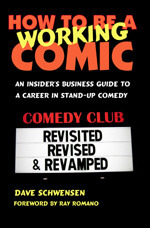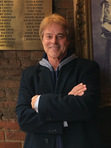Dave Schwensen's Blog, page 29
June 3, 2013
Flying under the radar to avoid Bad First Impression Land
Hey Dave – How are ya? I had a question for you. How do you know it’s time to start applying to the bigger clubs for MC spots? I know you said that the person booking talent will let you know, but I guess I mean on a more personal level knowing when it is time. I have been really good at keeping myself in check to not think I am better than I am and trying to do things I am not ready for (this could be a blessing and a curse), but I am coming off two comedy contest wins where I didn’t bring anyone and no one knew me, which I think is notable. But I am not sure if that translates into me being ready for something bigger. Thanks – CC
Hey CC – I’m doing fine, thanks for asking. Also thanks for asking this question because I was just talking about this in my workshop Saturday. So it’s a topic still fresh on my mind.
Also on my mind is the story I told them about a very good friend who didn’t keep himself in check long enough and tried to move ahead into the bigger clubs before he was ready. The end result stranded him in Bad First Impression Land when it came to playing the biggest club in New York City.
Here’s the story…
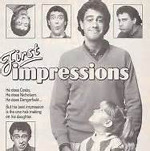
Bad 1st Impressions
My pal had been doing comedy on and off for – I think – about ten years before I even met him. I was just getting into the comedy biz by running a small club in the Gramercy Park area of Manhattan and invited him to do a set.
My first impression of him was that this guy was gonna be a star! He simply TORE the house down! He was extremely funny and the audience LOVED him. It was obvious he had the experience, material and a great stage presence. But I couldn’t figure out why he was so willing and available to play our small club on a Saturday night, when the best comics played the big-name NYC rooms.
A few months later I took over managing and booking shows at The Original Improv on West 44th Street (the legendary location in Hell’s Kitchen). I was suddenly my pal’s Golden Ticket – that I was his IN. I would recommend him to the owner – cuz I knew he’d be great – and invite him to skip the audition process and just do a guest set. After that I figured he would be a regular at the club – he was that good.
He said he didn’t think that would happen.
Say what?!
Then he explained he had auditioned at the club way before he was ready. He had only done about three open-mics, but thought they had gone great. The crowd laughed, he assumed he was a natural comedian, so he started showing up at auditions for the major clubs. In those days (maybe they still do?) we had a lottery system. A hundred or so comics would stand in line outside the club once a month in pavement melting heat (summer) or sub-zero temps (winter) hoping to pull an audition number. There were usually about 100 blank pieces of paper in a champagne bucket and 15 with a You’re The Winner! number. If you pulled out a number – you auditioned that same night.
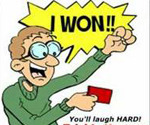 My pal would’ve been better off playing the Power Ball Lottery instead. He considered himself lucky by pulling audition numbers at the best clubs, with The Improv being one of them. The unlucky part was that he had only been on stage three times before his chance to make lasting-impression auditions in front of the most powerful club owners and talent bookers in New York City.
My pal would’ve been better off playing the Power Ball Lottery instead. He considered himself lucky by pulling audition numbers at the best clubs, with The Improv being one of them. The unlucky part was that he had only been on stage three times before his chance to make lasting-impression auditions in front of the most powerful club owners and talent bookers in New York City.
According to his painful memory, he bombed horribly. He hadn’t been ready and when faced with a real-life comedy audience (as opposed to a group of comics drinking beer in a late-night open-mic) he didn’t have the material and experience.
Still, I told him that had been years ago and it shouldn’t be a problem now. I had seen him and knew he was funny. I approached The Improv owner with his name and immediately learned a lesson in the importance of making a good first impression.
“Oh, I’ve seen him. He’s not very good. Use that guest set to see someone we don’t already know.”
His audition had been years before, but it was enough to keep him out of the clubs he couldn’t wait to play when he first started.
So when do you know it’s time to move up to the bigger clubs? That’s not an easy question and there’s no cut and dried answer, but here’s how I see it…
You never want to get stuck in the open-mic scene. Too many comedians (again, from what I’ve seen) make it their social life. It’s a night out with friends who have something in common (comedy) and it eventually turns out to be almost an after-thought to take a break from partying to run up on stage and do 3-5 minutes of dick jokes. After that, it’s back to socializing around the bar.
Potential working comics don’t do that. They use the open-mics for what they’re meant to be: a place to work on material and get on stage experience. The goal is to create an act that a talent booker would be willing to pay for.
———————————————————————————–
Sign up now for Dave’s free weekly newsletter and
receive 15% off the Amazon.com list price!
———————————————————————————–
So when is it time to get out of open-mics and into bigger clubs?
One is when you honestly (important factor) feel you can consistently get as many laughs (that’s the type of performance talent bookers pay for) as the acts already MC’ing at the bigger clubs. You know who they are because you’re part of your area comedy scene (correct?) and you know who’s MC’ing at the bigger clubs (correct again?).
If you honestly think you’re on the same level as the MC’s at those clubs, then it’s time to arrange an audition. If it’s a lottery system, start standing in line. If there’s a contest with the winner getting a booking at the club – enter. If the booker watches videos – send him a link to your website (you have one – correct?) with a video link, or a DVD if that’s how they watch submissions.
Another is by using the Golden Ticket I’ve talked about a LOT in these articles, (search contents to find what I mean). If you’re a good comic, the other comics will know about you (since you’re part of the same scene – again, correct?). If they really like your act and are already playing the bigger clubs you want to play, ask them if they’ll put in a good word for you and help arrange a showcase.
If you’re not ready, they’ll let you know because they (the smart ones anyway) don’t want to make a bad impression with a talent booker by recommending someone who’s not ready. And then again, I’ve known others who won’t recommend because the newer comic is funnier and they don’t want to risk losing their spots!
So how do you know if you’re ready?
Listen to the audience and honestly evaluate how you compare with comics already working the MC spots in the clubs you want to play. If you (and here’s that word again) honestly think you have the on stage experience you need and comedy material you know works, then it’s probably time to take the next step.
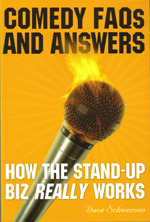 Remember what I’ve always said (it’s in my Comedy FAQs And Answers book if you don’t believe me):
Remember what I’ve always said (it’s in my Comedy FAQs And Answers book if you don’t believe me):
They may call it amateur night – but no one is looking to hire an amateur.
Get your experience under the radar first. This means in open-mic rooms and other venues where talent bookers are not as likely to see you. Have yourself prepared to make a first impression that will get you out of the open-mics – rather than one sending you back to a long term residency in Bad First Impression Land.
———————————
Dave Schwensen is the author of How To Be A Working Comic: An Insider’s Business Guide To A Career In Stand-Up Comedy, Comedy FAQs And Answers: How The Stand-Up Biz Really Works, and Comedy Workshop: Creating & Writing Comedy Material for Comedians & Humorous Speakers.
For information about these books, comedy workshops at The Cleveland Improv, and private coaching for comedians and speakers in person, by phone or via Skype visit www.TheComedyBook.com
Copyright 2013 – North Shore Publishing


May 28, 2013
Deliver your message with humor to get corporate gigs
Mr. Schwensen – I just completed a comedy workshop in Florida and also I’m reading your book How To Be A Working Comic. I would also like to learn about presentation and keynote opportunities. – Sincerely, EM
Hey EM – First of all, I write these newsletters for a bunch of funny comedians and humorous speakers. We’re not exactly standing up on the top tier of formality in our biz, so “Mr. Schwensen” and “Sincerely” will have to go. Our favorite terms of endearment are… well, since I promised to keep this newsletter rated G and PG for our younger readers (and the parents who screen them), I won’t make a list. But next time, “Hey Dave” will work just fine.
Second, thanks for the book plug. Saves me from having to do it myself this week… ha!
“Presentation and keynote opportunities.”
If I was a game show host we’d be celebrating right now because you just hit on a big-money topic. It also happens to be one that I don’t think enough comedians are taking advantage of.
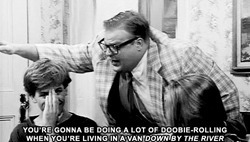
Matt Foley
Motivational Speaker
In the comedy / humorous speaking biz this fits under the category of corporate market. Of course there are speaking gigs available in the college and cruise ship markets, but mostly from my experience businesses, associations and social organizations look to hire speakers who are humorous. They’ll hire comedians, musicians, and variety acts for holiday parties, retirement banquets and in general, when they need entertainment.
But at a corporate function during other times of the year, event planners mostly look to hire presenters who can inform as well as entertain. And when that info-tainment requirement is laughter, they go for humorous speakers.
When I speak at a conference it’s usually as the opening or closing presenter. Why? Because – again from experience – the training seminars in the middle of a conference usually consist of the “hands-on” info attendees need for professional development.
If it’s a conference on say, law enforcement, the training seminars might teach the best way to bust crooks. If it’s about being a grocery clerk, they’ll learn new techniques in bagging groceries. Since the majority of humorous speakers don’t have training in either profession, we can still open or close the conferences with a general and humorous overview of – say – customer service, communications, team building, networking or whatever specialty we have to offer.
Then our goal is to customize it to the event. This is done through research, advance surveys, and interviews with the client. Then a humorous speaker can take their expertise, direct it toward the conference theme and attendees – and deliver it as informative and entertaining (info-tainment).
———————————————————————————–
Sign up to receive Dave’s free weekly newsletter and
receive 15% off the Amazon.com list price!
———————————————————————————–
As the opening presentation, a humorous speaker can be a great kick-off for the event and a preview for what comes later. At the end, it’s more of a wrap-up and ends the event on a high note: positive and memorable.
A stand-up comedian who doesn’t customize his act for the event can still get hired, but again, usually as pure entertainment.
But that doesn’t mean you – as an entertaining and humorous speaker – need to work laughs into a strict business program about… well, “corporate stuff” like taxes, productivity, networking, increasing sales and all that. If you have experience in those fields and can speak as a “trainer” with humor – you’re in!
But most comedians I know have more of a nightclub background rather than a corporate background.
So what you need to do – like with any comedy performance – is find a way to relate to the audience. It could be some common background or something that will interest them.
This is another way of saying know your audience.
The topic of the conference could be anything from business techniques such as learning power point or relieving office stress, to more personal topics like juggling a family and a career, to improving your golf game.
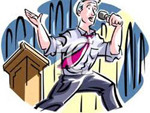
Talk Ain’t Cheap
Were you ever a lawyer, teacher, truck driver, bartender, parent, golfer or anything other than a comedian? Then you have a topic you can share with a corporate or social organization audience. Talk about your experiences with humor, add in the lessons you’ve learned along the way and that you can share with listeners, make it entertaining – and event planners will hire you to speak about it.
This also works if you have a particular message.
Have you or anyone close to you survived a disease, injury or other tragedy? I hate to list those suggestions as money-makers, but I’ve seen many comedians on the corporate and college circuits turning negatives into positives as humorous motivational speakers. If your story can help someone else – then it’s worthy of telling. And if you can make it entertaining, your audience will tend to listen and “get” your message. The same idea holds true for insights on bullying, alcohol awareness and other important topics. Do you have experience in these fields? Talk, share, motivate, teach, train and entertain as a comedian.
That’s what sells in the corporate market.
Be informative and humorous. That’s the key to becoming a non-holiday party corporate comedian / speaker / entertainer. This works for comedians, jugglers, magicians, and musicians – whatever. Make it informative as well as entertaining and you’ll work.
I’ll talk more about this topic in the coming weeks because I have a lot to share. But here’s another big hint that I wrote about in earlier newsletters.
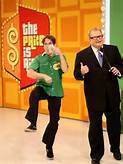
Favorite Game Show Host
Keep it clean!
For corporate shows, we’re talking G and PG (at the max) rated. Don’t even try to test that warning in an attempt to prove me wrong. You won’t – and you also won’t work corporate gigs where you can make more money in an hour than you can during an entire weekend at a comedy club. And that’s a correct answer to a big-money topic. Guess I should’ve been a game show host…
———————————
Dave Schwensen is the author of How To Be A Working Comic: An Insider’s Business Guide To A Career In Stand-Up Comedy, Comedy FAQs And Answers: How The Stand-Up Biz Really Works, and Comedy Workshop: Creating & Writing Comedy Material for Comedians & Humorous Speakers.
For information about these books, comedy workshops at The Cleveland Improv, and private coaching for comedians and speakers in person, by phone or via Skype visit www.TheComedyBook.com
Copyright 2013 – North Shore Publishing


May 20, 2013
Memorizing material: Is comedy like acting?
Hi Dave – Does a comedian write down their monologue and memorize it thoroughly? The more I learn about being a comic, the more it sounds like acting. Is there much of a difference? – JB
Hey JB – Okay, this is gonna tick off some of the actors reading this. Before we continue, let me say that I respect the craft of acting. Make that good acting.
It’s not easy being an actor because you have to learn to express emotions on cue and make it all believable. When you’re in a long running play it involves a lot of repetition – every show. When you’re interacting with other actors you must be on the right spot at the right time and say the correct words to cue a response. The words are in the script, so no arguing about this statement is necessary.
Acting also involves practiced lighting, props, entrances, exits and even bows (curtain call) at the end. Plays, TV shows and movies are directed. Actors do what directors tell them and say what writers tell them to say. And one last thing – the audience is not involved. People in the seats are there to watch. Professionally it’s called a fourth wall on the stage and that’s the invisible wall separating the audience from the actors.
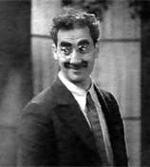
Groucho Marx
As with everything, there are exceptions. Improvisational acting involves more creativity and spontaneity by the actors as they invent dialogue that are sometimes suggested by the audience or based on a loosely structured script, (as in doing a skit). For example, Marx Brothers movies, (I like the classics also), wouldn’t be as funny if Groucho didn’t break through the fourth wall every once in awhile and deliver a few wise-cracks directly to the camera/audience.
I’ve known a lot of great actors who are lousy comedians. Especially the ones who show up for comedy club auditions claiming to be great comics, but can’t buy a laugh once they’re on stage.
They’re acting the role of a comedian, but don’t know the first thing about it.
I guess what I’m really saying is that I think it’s more difficult to be a great comedian than it is an actor. Period. Argue if you want, but that’s my opinion.
Why? It’s because a comedian has to work off an audience, rather than working with another rehearsed actor. Stand-ups deliver material and deal with an audience at the same time. A comedian who just memorizes a monologue and recites it with no regard to audience response is acting. They’re doing a one-person, (acting), show. It may be based on a stand-up routine, but it’s not stand-up comedy.
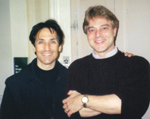
Robert Dubac with Dave
Again, there are exceptions. Robert Dubac is a great stand-up comedian who does great one-man theatrical (acting) shows. He has a script, but he also works off an audience. If you haven’t checked out The Male Intellect: An Oxymoron, then you’re missing both great comedy and great theater.
Another is the talented English comedian / actor Dave Gorman. His show Googlewhack Adventure had me crying with laughter. But talking about what he and Dubac can do with a script and stand-up comedy experience would fill another article, so I’ll just leave it at that for now.
———————————————————————————–
Sign up to receive Dave’s free weekly newsletter and
receive 15% off the Amazon.com list price!
———————————————————————————–
My point in saying all this it that yes, you can write and memorize a monologue and perform it in a comedy club. Lots of comedians do it. But unlike acting, a comedian has to be prepared to deal with audience response.
An audience is usually unpredictable. They may not laugh when expected and laugh hysterically when it’s not expected. A good stand-up will react also. If the material is not going over as expected, they can switch gears. This means they can pull out different material, work-off (talk) to the audience or change their delivery. It involves having a lot of material, some ability to improvise and on-stage experience. Actors stick to the script and hope the same material works better the next night.
If you memorize your comedy routine word for word, it MUST be conversational. It MUST seem as if you’re making it up on the spot. I gave an example last week about using your personality on stage. The same example holds true here…
Imagine you’re with a group of friends at a party. Everyone’s been telling stories and now it’s your turn to talk. You have a funny story, joke – whatever – that you want to share. How would you deliver it to your friends in a way that will make them laugh?
I’ve seen comedians night after night deliver the same routine word for word. Their gestures and facial expressions are the same every night. Does it work? YEAH – if they’re an experienced comedian because it will look like they’re saying it for the first time at every show.
For example, there is a VERY famous comedian I’ve booked dozens of times. I won’t give his name – but if you’ve ever taken my workshop you know who I’m talking about, (because I tell this story and mention his name!). Every show he delivered the exact same act. It was great, it worked and it took him years to develop his material.
One night during a very late show with a very light audience, another famous comedian stood on stage behind him and mimicked his act exactly. It was like having a shadow. We were all in the back of the club laughing – and so was the headlining “star” comedian on stage. But it didn’t matter because his act was great and each time he did it he made it look as if it was brand new. It was memorized – but the audience had no idea and that’s what counts.
Hang around comedy clubs and you’ll see what I mean. Watch some of the comedians more than a few times and you’ll see they do the same routine for each show. For some it’s completely memorized, but the best ones know not to deliver it that way.
Other comedians will follow a mental outline for their monologue. They deliver the same jokes / stories with the same punch lines, but allow themselves to improvise and work off the audience. It keeps it entertaining for the comedian and they don’t get bored doing the same show over and over.
As always, the most important element is the material. You need to have funny material that makes an audience laugh. When it does – then you keep it in the act until eventually you replace it with better material. It’s a never ending process if you want to be a working comic.
There’s nothing wrong with memorizing your act if it helps you feel more comfortable. The key is to make it seem conversational and like you’re saying these words for the very first time. It’s like going to a different party and telling the same story to a different group of friends. If you did it successfully the first time and want the same reaction at this party, chances are you’ll deliver it in a very similar way. In other words – it’s your act.
———————————–
Dave Schwensen is the author of How To Be A Working Comic: An Insider’s Business Guide To A Career In Stand-Up Comedy, Comedy FAQs And Answers: How The Stand-Up Biz Really Works, and Comedy Workshop: Creating & Writing Comedy Material for Comedians & Humorous Speakers.
For information about these books, comedy workshops at The Cleveland Improv, and private coaching for comedians and speakers in person, by phone or via Skype visit www.TheComedyBook.com
Copyright 2013 – North Shore Publishing
May 13, 2013
Personality separates you from the competition
Hi Dave – Many of my friends think I am funny in an I Love Lucy kind of way… which I suppose comes naturally. However, I am not sure how to release that side of me when I am giving a presentation. Thanks – DB
Hey DB – When it comes to giving a presentation as a humorous speaker or doing a set as a comedian, you must connect with your audience. That’s the bottom line – period. If you don’t connect, they don’t listen.
What’s a great way to connect? By doing what comes naturally and showing off your personality. Let me explain…
Working comics know performing stand-up is more than telling jokes. Anyone can tell a joke, (some better than others). But to be a successful performer, you need to show who you are on stage.
Comics, agents, managers and talent bookers call it your comedy voice. For our purposes, we’ll call it your personality as a speaker.
The classic joke-tellers like Rodney Dangerfield and Henny Youngman, (to mention only two), had GREAT personalities on stage. That’s what sold their material to an audience.
They could do a series of basic, (and clever), one, two or three line jokes that fans couldn’t wait to re-tell the next day around the water cooler or in school. The fans’ renditions might get laughs from their coworkers and friends, but rarely ever the same as the originals. As imitators, we couldn’t match their personalities.
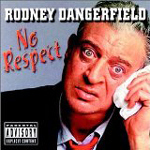 That’s why Dangerfield and Youngman (and if you don’t know these guys, brush up on your comedy history) were paid big bucks to do their jokes on stage while the rest of us (the fans) got detentions for re-telling their jokes in school.
That’s why Dangerfield and Youngman (and if you don’t know these guys, brush up on your comedy history) were paid big bucks to do their jokes on stage while the rest of us (the fans) got detentions for re-telling their jokes in school.
Dangerfield’s jokes worked because of his personality – who he was on stage (his comedy voice). He had a talent for putting himself down…
“I get no respect.”
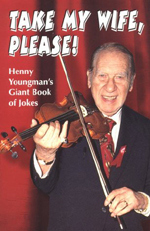 Youngman’s personality made him a natural at making wise-cracks (another talent most of us shared to earn school detentions)…
Youngman’s personality made him a natural at making wise-cracks (another talent most of us shared to earn school detentions)…
“Take my wife… please!”
Without showcasing their personalities, these legendary comics might never have stood out from the pack of other wise-cracking joke-tellers.
The same can be said of humorous speakers.
I always get a laugh at – as opposed to with – humorous speakers who call themselves humorous speakers just because they throw in a lame joke once in awhile during a presentation. I’m sure you know what I’m talking about…
———————————————————————————–
Sign up to receive Dave’s free weekly newsletter for comedians and humorous speakers at…
———————————————————————————–
For the opening of their presentation they’ll repeat a joke they found on the internet or even worse, take an old joke and re-work it to make it seem as if it were a true story that pertains to their topic.
This – they think – makes them a humorous speaker.
I’m almost gagging as I write this since it reminds me of how I’ve seen speakers do this WAY too often. For some reason they hide their fun(ny) personalities, (we all have one, though some are more outgoing than others), because they assume it’s the only way to be taken seriously as trainers and educators.
That’s fine if you’re strictly a no-frills, non-humorous speaker, trainer or educator. But if you’re billed as a humorous speaker and want to stand out from the competition it’s important to use your natural talent.
Your personality.
So… your friends say you’re similar to the legendary Lucille Ball? Then there must be some truth in their opinions. I assume you’re not trying to imitate Lucy – you just somehow remind people of her. It’s part of your personality.
As a humorous speaker you want to find a way to bring your personality onto the speaker’s platform with you. It’s who you are and what makes you an individual and unique when compared to others who speak on the same topic. That’s what helps separate you from the competition – the other humorous speakers who want to be hired for the same gig.
You don’t have to imitate Lucy. In fact I recommend you DON’T imitate Lucy. Unless you’re hired to play her as a character it would take the believability away from your message. But if you have a talent for making funny statements or even physical humor – which is probably why your friends compare you to Lucy – then use your talent in your delivery.
But before you plan on filling your mouth with chocolate candy or presenting from a scaffold on the side of a building, (I Love Lucy fans know exactly what I’m talking about), keep in mind Lucy’s style of physical comedy doesn’t necessarily mean slapstick comedy. You don’t have to overdo it to stand-out.
Keep it simple. It could just be a look or way you naturally use your hands. If it’s part of your personality, what good does it do to hide it?
If you’re in the humor game, it’s all about not being a stiff, boring speaker. Use your natural personality to connect with an audience.
————————————————————————
On sale NOW in paperback and Kindle
————————————————————————
Here’s the bottom line. You don’t need to tell jokes to be an effective humorous speaker. If you have a signature story, examples or descriptions that an audience might find funny – make them funny. Don’t be afraid to use facial expressions, hand gestures or movement. Don’t get stuck standing in one place showing a power point or simply reciting solutions to problems.
Use your personality. It’s a natural talent that you probably use everyday. Think of the last time you were together with a group of friends. Maybe you were sitting around someone’s kitchen table and you wanted to tell them about something that happened to you that day. It could be as simple as your drive to work, but something interesting (and hopefully) funny happened.
How would you tell it in a way that would get the reaction you wanted? How could you tell it in a way that would make your friends laugh?
Here’s a good tip. Think of the audience as a room full of friends. How would you deliver your message (the point of your presentation) to them in a way that not only informs, but will also entertain them?
By using your personality.
They’ll remember you over a boring speaker (or one trying to entertain with an old joke you’ve probably heard before) with the same message. That’s how you stand out from the competition.
It worked for Rodney, Henny and Lucy – and more than a few humorous speakers and working comics. There’s no reason why it can’t work for you too.
———————————–
Dave Schwensen is the author of How To Be A Working Comic: An Insider’s Business Guide To A Career In Stand-Up Comedy, Comedy FAQs And Answers: How The Stand-Up Biz Really Works, and Comedy Workshop: Creating & Writing Comedy Material for Comedians & Humorous Speakers.
For information about these books, comedy workshops at The Cleveland Improv, and private coaching for comedians and speakers in person, by phone or via Skype visit www.TheComedyBook.com
Copyright 2013 – North Shore Publishing



